81% Israelis support freedom of religion and conscience
2021 Israel Religion & State Index
Hiddush released its annual Israel Religion and State Index. This is the 13th Index published by Hiddush since its inception in 2009, published annually on the eve of Rosh HaShanah. The Index is the only systematic and in-depth periodic review of Israel’s adult Jewish public’s attitudes on matters of religion and state.
02/09/2021 22:45
Tags: Hiddush polls · Religion and State Index · Religion & State Index · Israel Religion and State Index · IRSI
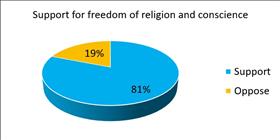
Support for Freedom of Religion and Conscience
[Click for FULL SIZE]Hiddush - for Freedom of Religion and Equality released its annual Israel Religion and State Index [to read the Index, click here]. This is the 13th Index published by Hiddush since its inception in 2009, published annually on the eve of Rosh HaShanah. The Index is the only systematic and in-depth periodic review of Israel’s adult Jewish public’s attitudes on matters of religion and state. Its findings present a comprehensive picture of all the controversies in this realm, and this year – it provides a special emphasis on the public's views regarding the new government’s religion-state agenda.
The Index provides a detailed analysis of positions; breakdowns by religious and political views, comparisons over time; additional relevant background elements; and an emphasis on the views of voters for the different parties in the last election and of those who are undecided as to whom to vote for in the next elections.
The past year brought with it a new governing coalition in Israel. The new government was formed amid fierce conflicts with the ultra-Orthodox parties over religion and state issues. The Index indicates that not only does most of the Israeli Jewish public support the dramatic changes that the new government is initiating, but so too do most Likud voters. This is not a change in public attitudes, but the opposite. The Index shows a stability over years in support of religious freedom and equality (with limited oscillations), and the shift is actually on the part of the new government, which is representing the will of the public more faithfully in this regard than its predecessors.
Among the various initiatives of the new government in the realm of religion & state, the three that the public considers most important are: public transportation on the Sabbath; the enforcement of core curricular studies in ultra-Orthodox education, using positive and negative budgetary incentives; and the official registration of couplehood for those couples that cannot marry in Israel [it should be emphasized that with regard to the issue of marriage freedom, the vast majority of the public wants freedom of choice in marriage for all, not only the option of couplehood registration]. Only 19% of the adult Jewish public responded that none of the issues listed were important to them. As for the secular public - only 4% responded that none of the issues are important to it.
Further, the Index illustrates that the majority of the public supports equal status for the non-Orthodox Jewish denominations and women’s and egalitarian prayer groups at the Western Wall. However, in terms of order of importance and priority, these issues are only mentioned in some of the coalition agreements at the bottom of the list.
Most Israeli Jews support both the principle of “Religious Freedom and Equality” and separation of religion and State, but many distinguish between the two and express preference for the first over the latter, which they view as calling into question the Jewish identity of the State of Israel. 81% support freedom of religion and conscience in Israel [freedom of choice and behavior for secular and religious people according to their religious worldviews], while only 59% support separation of religion and state.
61% of the public supports equal status in Israel for the 3 major Jewish denominations - Orthodox, Conservative and Reform. Among the secular public, the support rate is 88%. It is supported by the majority of voters for all coalition parties [except for Yamina voters, who are divided on the issue. 48% of them support equal status for the denominations]. 57% of Likud voters in the March 21 elections also expressed support.
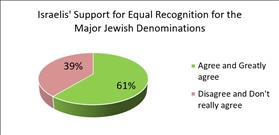
Israel's support for equal recognition for the major denominations
[Click for FULL SIZE]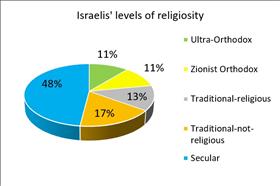
Israelis' levels of religiosity
[Click for FULL SIZE]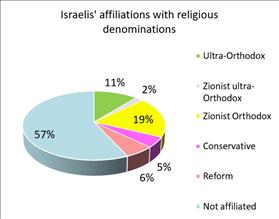
Israelis' affiliations with religious denominations
[Click for FULL SIZE]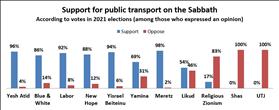
Support for public transportation on the Sabbath
[Click for FULL SIZE]The Index provides an important perspective as to the way Israeli Jews identify Jewishly. The “traditional” approach to the categories of Israeli Jewish identity did not account for the religious denominations. When using this approach, the Index shows that 65% Identify themselves as either secular [48%] or “traditional-non-religious” [17%] [whose positions regarding public policy on religion & state are resemble the positions of secular Israelis]; 11% identify as ultra-Orthodox, 11% - Zionist Orthodox, 13% - traditional-religious.
Asking about identification with the religious denominations active in Israel we clearly see its relevance to the Israeli religious tapestry. While the majority do not associate themselves with any denomination [57%], 19% identify as Zionist Orthodox, 11% - ultra-Orthodox, 11% - Reform / Conservative and 2% - Zionist ultra-Orthodox.
As the Chief Rabbinate and the ultra-Orthodox parties are fighting to preserve their monopoly over conversion, they are waging battles against the recognition of Modern Orthodox conversions and do not focus solely on fighting against non-Orthodox conversions. Most of the Israeli public, including the majority of voters for all the coalition parties, do not view Orthodox conversion as a condition for State recognition of immigrants’ civil status as Jews. Only 35% hold that State recognition should be conditional upon Orthodox conversion, versus 35% that support the State recognizing the civil Jewish status of all descendants of a Jewish parent (regardless of whether it is the father or the mother) who identify as Jewish and are absorbed into the Jewish community, and another 30% that are satisfied with any religious conversion common among world Jewry, whether it be Orthodox, Conservative or Reform.
64% support the operation of public transportation on the Sabbath at the discretion of Municipal authorities as to the routes and frequency of service. This position is shared by a large majority of voters from all coalition parties – Including Yamina [69%], as well as 54% of Likud voters.
As for the growing conflict over the Chief Rabbinate's continued monopoly on kashrut certification, the Index data show that most of the public does not support maintaining the monopoly. Only 22% responded that they would eat only in restaurants with kashrut certificates from the Chief Rabbinate, while 25% would be satisfied with alternative kashrut certification [such as from Tzohar or from ultra-Orthodox bodies]. 53% do not take kashrut certification into account at all when choosing where to eat and what food to buy. Even among the 41% of the public that indicated that they observe strict kashrut according to Halacha, less than half [47%] responded that they consume only food under the supervision of the Chief Rabbinate. Most voters of all coalition parties do not limit themselves to food that is certified kosher by the Chief Rabbinate [Even among Yamina voters, only 18% do so].
Although the ultra-Orthodox parties are not part of the current government coalition, a desire was expressed by Yamina and Yesh Atid to fold them into the coalition. This contrasts with the position of the majority of the public [59%] that opposes it. The leaders of Yamina and Yesh Atid have preserved the budget allocations for yeshivas (Approximately one and a quarter billion shekels) to help facilitate bringing the ultra-Orthodox parties onto the Coalition, but the vast majority of Israel’s adult Jewish public [73%], holds that this budget should be eliminated completely or significantly. This is supported by a huge majority of voters for all the coalition parties, including Yamina [82%].
The Index and a comparison of its data over the last ten years prove that the Israeli public is fed up with the ‘status quo’ on religious issues, which belies the worn-out rhetoric of many politicians regarding Israel’s ‘traditional, religiously inclined majority’. They misrepresent the truth, and mislead Jewish leadership, claiming that most Israeli Jews wish to maintain the State’s religious coercion in matters of Shabbat, marriage, kashrut, ‘Who is a Jew’, and more. The compelling and consistent Index data refutes this self-serving distortion of the truth. The public supports religious pluralism and prefers a broad, civil coalition, which does not submit to the dictates of the ultra-Orthodox parties, as shown by the many surveys we and others have conducted over the past few years and during the recent election cycles. The majority of the Israeli public identifies with and hopes for the full realization of the Declaration of Independence’s promise of freedom of religion and equality. Israeli Jews value the partnership with Diaspora Jewry, as well as the promotion of true unity rather than artificial uniformity.
The survey for the Israel Religion and State Index was conducted by the Smith Institute in July 2021 with an expanded sample of 800 people representing the adult Jewish population in Israel, aged 18 and over. Sampling error ± 3.5%
Select Findings
What kinds of Jews are Israelis? - 65% identify as secular [48%] or "traditional-non-religious" [17%]. 11% identify as ultra-Orthodox; 11% - Zionist Orthodox; 13% - traditional-religious. As for identification with the religious denominations, while the majority of the Jewish public does not identify with any of them [57%], 19% identify as the Zionist Orthodox; 11% - ultra-Orthodox; 11% - Reform / Conservative; 2% - Zionist ultra-Orthodox.
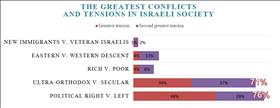
The greatest conflicts and tensions in Israeli society
[Click for FULL SIZE]The main conflicts in Israeli society - In Jewish society in Israel, there are many internal tensions and conflicts. In the annual Index, it once again shows that the tension between ultra-Orthodox and secular Israeli Jews is at the top of the scale. This and the clash between political right and political left have the highest severity rating, far above those familiar to us from the past, such as being descended from European v. Arab countries, rich v. poor, and veteran Israelis v. immigrants.
Religion and State Relations - 81% of the public supports freedom of religion and conscience [freedom of choice and behavior for secular and religious people], 59% support the separation of religion and state.
Let marriage freedom ring - 63% support Israel recognizing all types of marriage, including Conservative, Reform, and civil. About half of the population [49%] would choose not to marry in Orthodox wedding ceremonies if the law allowed it.
Equal status for all streams in Judaism - 61% support the granting of equal status in Israel for the three major Jewish denominations - Orthodox, Conservative and Reform. 69% support the announcement of the new Minister of Diaspora, Nachman Shai, that "The Jewish tent is big, and it can and should contain all of the Jewish people’s denominations and communities. As Minister of the Diaspora, I am committed to the State of Israel being equally open to all Jewish denominations."
Sabbath observance - The majority of Israel’s Jewish public does not observe Shabbat according to religious law [73%]. Of these, 21% keep some of the Sabbath traditions (e.g., lighting candles or making kiddush); 30% do not observe Shabbat religiously but consider it a day of rest with a special atmosphere; and 22% consider Saturday a normal day off.
Equality of civil burden - The Supreme Court ruled that the mass exemption for yeshiva students from service in the IDF is unconstitutional and severely undermines the principle of equality. It ruled that the current law will be nullified shortly. According to the findings of the Index, only 23% hold that the exemption for yeshiva students is acceptable because “the Torah is their craft”. 51% of the public supports the position that an annual quota of exemptions for outstanding yeshiva students should be set. As for the rest, conscription into the IDF or national-civil service must be mandatory. The remaining 26% believe that all Yeshiva students should be conscripted for full-time regular service.
Core curriculum for everyone - 75% hold that state-funded ultra-Orthodox schools should be required to teach core curricular studies; and should they refuse, their funding should be cut. Alongside this, 71% also hold that all state-funded ultra-Orthodox schools should be obligated to participate in the national Meitzav tests to examine the extent to which they meet their core curricular teaching obligations. Only 25% of the public is of the opinion that core curricular studies should not be required of them and that parents should be allowed to select an education for their children without core curricular studies, without jeopardizing the funding they receive from the state coffers.